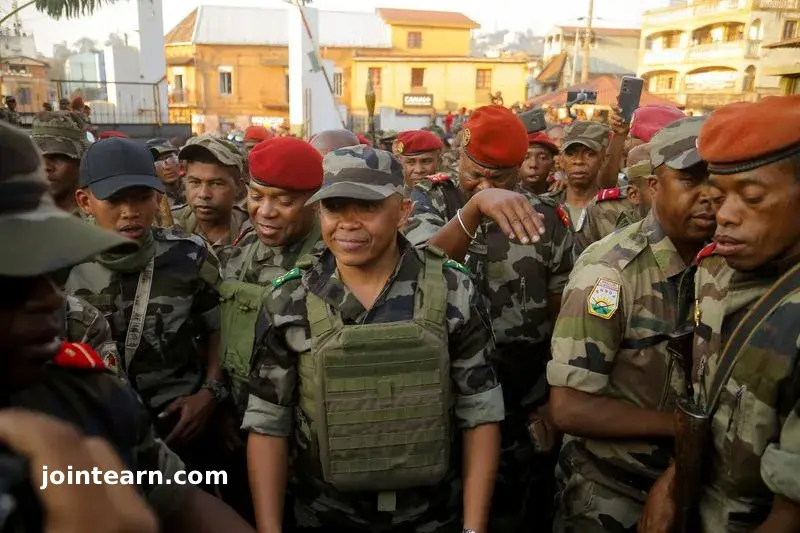
ANTANANARIVO, Madagascar — October 16, 2025 — Madagascar is facing a dramatic political shift as Colonel Michael Randrianirina, a senior Malagasy military officer, announced that he will assume the presidency following a military coup that overthrew civilian leader President Andry Rajoelina.
The colonel’s declaration comes amid nationwide youth-led protests over worsening power outages, severe water shortages, and deep frustration with corruption and poor governance in the island nation.
Military Leadership Takes Control Amid Youth Protests
Colonel Randrianirina made his announcement at a Malagasy military base in Antananarivo on October 14, 2025, addressing both soldiers and demonstrators who had gathered on Independence Avenue. His remarks came during one of the largest mass movements the country has seen in over a decade — spearheaded by young protesters demanding accountability and reform.
According to witnesses and Reuters reports, the colonel was warmly received by protesters who view the army as a potential agent of stability amid economic decline and political disillusionment.
Swearing-In and the Creation of a Transitional Government
Randrianirina confirmed that he will be officially sworn in as “President for the Refoundation of the Republic of Madagascar” during a formal ceremony overseen by the High Constitutional Court. The inauguration is set for Friday, October 17, 2025, marking the official start of what he called a “refounding period” for the country.
“The military has taken responsibility for the survival of the Republic,” Randrianirina declared in a televised statement. “We will restore order, rebuild our institutions, and prepare Madagascar for a democratic transition.”
Under the new plan, the military-led committee will govern alongside a transitional civilian government for up to two years, after which national elections are expected to take place.
African Union Condemns Coup and Suspends Madagascar
The African Union (AU) has responded swiftly, suspending Madagascar’s membership with immediate effect. The organization cited the unconstitutional seizure of power and called for a return to civilian rule.
Randrianirina, however, appeared undeterred by the decision, telling journalists that the AU’s move “was expected.” He also expressed willingness to engage in behind-the-scenes negotiations with the bloc to prevent further diplomatic isolation.
“From now on, there will be discussions with our African partners,” the colonel said. “We understand their position, but our primary duty is to the Malagasy people.”
Ousted President Rajoelina Condemns Takeover
Former President Andry Rajoelina, who reportedly fled the country during the weekend amid mounting unrest, has condemned the military takeover and insists that he remains the legitimate leader.
Rajoelina’s downfall was precipitated by youth-led Gen Z protests, which intensified as fuel shortages, water rationing, and blackouts crippled Madagascar’s already fragile infrastructure. Growing defections within the security forces further weakened his authority and paved the way for the colonel’s rise.
Madagascar’s Long History of Political Instability
Madagascar, a nation of 30 million people, has faced repeated cycles of political turmoil since gaining independence from France in 1960. Three-quarters of its citizens live in poverty, and according to the World Bank, the country’s GDP per capita has fallen by 45% between 1960 and 2020.
Randrianirina himself is no stranger to political upheaval. He once served as a commander in the elite CAPSAT army unit, which played a pivotal role in the 2009 coup that brought Rajoelina to power. His recent defection from Rajoelina’s camp, coupled with his refusal to order soldiers to fire on demonstrators, positioned him as a key figure in the new military-led movement.
Looking Ahead: Uncertain Future for Madagascar
The coming weeks are likely to be decisive for Madagascar’s future. The African Union’s suspension could strain international relations and delay aid to one of the world’s poorest nations. At the same time, Randrianirina’s pledge to restore democracy within two years has sparked cautious optimism among younger Malagasy citizens, many of whom see the transition as a potential turning point.
Whether this new chapter will lead to genuine reform or further instability remains to be seen. For now, Madagascar stands at a crossroads — balancing the hope of renewal against the risk of another prolonged period of political uncertainty.


Leave a Reply